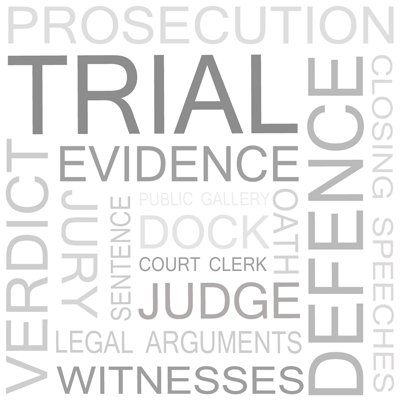Using this website to prepare for court
All Contents > Barristers & Solicitors > Direct Public Access Barristers > Going to Court? 10 Essential Tips > Which court will I go to? > Criminal Law
“The purpose of this website is to help and inform you, whatever part you will play in the criminal justice system, by providing free information on all aspects of the criminal process, from pleading guilty, having a trial, being sentenced and - should it come to this - appealing against a conviction or sentence. ”
1. Making your life easier
Going to court is a stressful experience. Not only is it unfamiliar territory for most people, but there is also the fear of not knowing what the outcome will be.
If you are a defendant, you will be concerned about the trial, sentencing or appeal process. If you are having a trial, you will be understandably anxious about being found guilty. Similarly, if you are found guilty or have pleaded guilty, you may be consumed with concern about what will happen to you - will I go to prison? Could I get a suspended sentence? Or might I get a community order or a fine?
If you are attending court as the victim of an offence, or as a prosecution or defence witness, this may be the first experience you will have of speaking in a public place. You may worry about whether you will be believed and what will happen when you are questioned by a solicitor or barrister for the other side?
The simple fact is, whether you are on the side of the prosecution or the defence, whether you are a defendant, victim or witness, or whether you have just received a summons for jury service, going to a criminal court can be a tough experience.
Recognising this, and recognising that you are not alone in feeling this, is one part of preparing for what awaits you. The next part is finding out what is involved and what to expect, since the more you understand about the court process, the more able you will feel to cope.
2. Take time to inform yourself
The purpose of this website is to help and inform you, whatever part you will play in the criminal justice system, by providing detailed information on all aspects of the criminal process, from pleading guilty, having a trial, being sentenced and - should it come to this - appealing against a conviction or sentence.
You will also find information on questioning in the criminal courts (examination-in-chief, cross-examination and re-examination), measures used to assist witnesses and defendants, information about barristers and solicitors (and how to find one), and how the prosecution choose to prosecute in the first place.
The information below is intended to assist you when it comes to going to court and understanding the legal process from a practical point of view.
3. Understanding criminal law and lawyers
Criminal Law
A good place to start is to understand the basics of the criminal law, including what a criminal case is, how cases are started (and by whom), the burden and standard of proof, how to analyse a criminal offence, the rules which govern criminal procedure and the online legal publications and websites which can help you. Note that links are also provided throughout this website to further information.
For this information, go to Criminal Law >>
Prosecutions
After this, you may find it helpful to get to grips with how decisions to prosecute are made, including the Evidential and Public Interest tests, as well as who can bring a prosecution and how a case is started.
You can find out about out-of-court disposals (i.e. alternatives to prosecution), how to review decisions not to prosecute, and information about private prosecutions.
For this information, go to How prosecution decisions are made >>
Criminal lawyers
If you have been charged with an offence you will probably want to know more about criminal lawyers (principally barristers or solicitors), what they do and how to find one.
For this information, go to:
4. Considering whether to plead guilty
Pleading guilty to an offence means that you accept you have committed that offence. For this reason, following a guilty plea there is no need for a trial and the court will proceed to sentence, either immediately or at a later hearing.
You should not plead guilty unless you know precisely what it is you are pleading guilty to. Some offences are technical in nature and, where possible, it is important to receive legal advice before making that decision. Similarly, you may think you are guilty, when actually you have a defence available to the charge, such as self-defence.
If you do not accept that you are guilty of the offence, then you should plead Not Guilty. This means that your case will then go to trial where the prosecution will seek to prove that you are guilty. It may be that you want an advance indication of what your sentence will be before you decide whether to plead guilty or to go for trial.
On the Guilty Plea pages, you can find out all you need to know about pleading guilty, from achieving a reduction in sentence and an advance sentence indication, to plea bargaining, changing your plea and appealing after a guilty plea.
For this information, go to:
Part 1 Pleading Guilty, Plea Bargaining and Unfitness to Plead (this page);
Part 2 Reduction in Sentence (Credit) for a Guilty Plea and for Assisting the Prosecution;
Part 3 Basis of Plea, Fact-finding Newton Hearings and Advance Sentence Indications;
Part 4 Changing Plea and Appeals following a Guilty Plea.
5. Help with going to trial
Magistrates’ Court or Crown Court?
When criminal cases go to court, every case will start at the magistrates’ court and this is where the overwhelming majority will stay. However, some cases can move on to the Crown Court, either for sentence (dealt with below) or for trial by jury.
Depending on the type (or classification) of offence you face, and the complexity and seriousness of the case, your case will either be tried in the magistrates’ court, or alternatively it will be sent for trial to the Crown Court. Sometimes you can elect trial by jury.
For more information on this, go to
Trial Guides
Since some trials are heard in the magistrates’ court and others in the Crown Court, there is a guide for each covering the trial process from start to finish, including the formalities you will need to comply with, what to expect and how to prepare for case management hearings. Taking the time out to read them with care will place you in a position to prepare and understand each step of the process you will go through.
For this information, go to:
6. Understanding how witnesses are questioned
All evidence at trial relates to a witness in one way or another, whether it be the victim or an eyewitness to an assault, a shopkeeper producing a video recording of a burglary caught on a security camera, or a forensic accounting expert analysing financial records in a fraud case,
The principal way of presenting evidence at trial (i.e. to the magistrates or a jury) is done by calling and questioning witnesses, including defendants (should they choose to give evidence).
Examination-in-chief, cross-examination and re-examination
When a witness is taken through their evidence, this is known as their evidence-in-chief (and the questioning process as examination-in-chief). After this the witness will be cross-examined and then they might be re-examined. You can read more about each type of questioning on this website.
Competence and Compellability
Most witnesses are ‘competent’ to give evidence, but not all witnesses (e.g. spouses and civil partners) can be compelled to give evidence, except in certain circumstances. Sometimes a witness summons will be issued to compel a reluctant witness to atend court.
Hearsay
The hearsay rules may prevent you relying on the evidence of a witness unless you can actually get that witness to court, unless certain exceptions apply. Knowledge of the hearsay rule helps you prepare your case for trial.
In summary, relying on the evidence of witnesses and questioning witnesses is a crucial part of the trial process and you can read more about it on this website.
For more witness information, go to: Witnesses >>
For more about questioning witnesses, go to: Advocacy and Questioning >>
For more about hearsay, go to Hearsay >>
7. Understanding witness protection and support
There are a range of measures to assist witnesses and defendants to give evidence in criminal cases.
From Special Measures to Witness Protection
On this website you will find further details, including Special Measures for vulnerable witnesses and defendants (such as giving evidence by video link, from behind a screen or by pre-recorded examination-in-chief, cross-examination and re-examination), Witness Anonymity Orders, reporting restrictions, restrictions on cross-examination, the criminal offences of Witness Interference and Taking Revenge, conditional bail and Witness Protection Programmes.
For this information, go to Witness Protection and Support >>
8. What to expect at sentencing
Will I go to prison?
If you plead guilty or are found guilty after a trial, you will then be sentenced. The question, ‘Will I go to prison?’ is at the forefront of many people’s minds when they are faced with a criminal charge. Understandably, it is a question many criminal barristers will be asked by their clients.
The guides on this website will help you understand how sentencing works and how judges decide on what sentences to pass for particular offences in a variety of different circumstances (which often do not include prison), as well as getting rid of a number of common misconceptions about sentencing.
Types of sentence
Custodial sentences, suspended sentences, community orders, fines and absolute & conditional discharges (and more) are covered. You can also find out exactly what to expect when you go to court for your sentencing hearing.
For all sentencing information, go to: Sentencing >>
9. What to do if your sentence is too harsh
Appeal against sentence
If you feel the sentence passed in your case is excessive, such as when a prison sentence has been passed when a non-custodial sentence was more appropriate, or when the prison sentence is just far too long in the circumstances of the case, you can seek to reduce the sentence by appealing against sentence to a higher court.
Magistrates’ and Crown Court appeal guides
The appeal process differs depending on whether you were sentenced in the magistrates’ court or the Crown Court. Appeals from the magistrates’ court are far more straightforward and you have 15 business days from the sentence being passed to appeal to the Crown Court. Appeals to the Court of Appeal (Criminal Division) against Crown Court sentences are more complicated and start with an Application for Permission to Appeal and grounds of appeal within 28 days of sentence. Below you will find guides to each appeal process.
For this information, go to:
10. How to overturn a wrongful conviction
Appealing against conviction
A conviction is a finding that you are guilty of a criminal offence. You can only be convicted of an offence in one of two ways: first, by pleading guilty; or second, by being found guilty following a trial. Whether you have pleaded guilty or were convicted after trial, you may be able to appeal against your conviction.
The purpose of this type of appeal is to quash the conviction. If the appeal is allowed, the conviction will either be set aside or, in some cases, it can be substituted for another less serious offence (e.g. murder to manslaughter).
Magistrates’ and Crown Court appeal guides
The appeal process differs depending on whether you were convicted in the magistrates’ court or the Crown Court. If you feel you have been wrongly convicted following a trial in the magistrates’ court, you have the automatic right to appeal against your conviction to the Crown Court within 15 business days of your sentence. If you have been wrongly convicted in the Crown Court, you can apply within 28 days (of conviction) for permission to appeal against your conviction to the Court of Appeal (Criminal Division). Below you will find guides to each appeal process.
Supreme Court, ECJ and CCRC
There is also information available on appealing to the Supreme Court and the European Court of Justice, and referring a case to the Criminal Cases Review Commission (CCRC).
Case Stated appeals
A less usual and more complicated type of appeal from the magistrates’ court (or from the Crown Court having heard an appeal from the magistrates’ court) is an appeal direct to the High Court, or more specifically to a specialist court called the Administrative Court. This type of appeal is known as an Appeal by way of Case Stated. It can be made by either the prosecution or defence and is reserved for appeals relating to matters of law (specifically cases where it is argued that the magistrates or District Judge were wrong in how they interpreted or applied the law, or that they acted in excess of their jurisdiction, i.e. they did not have the power to act as they did).
For this information, go to:
















